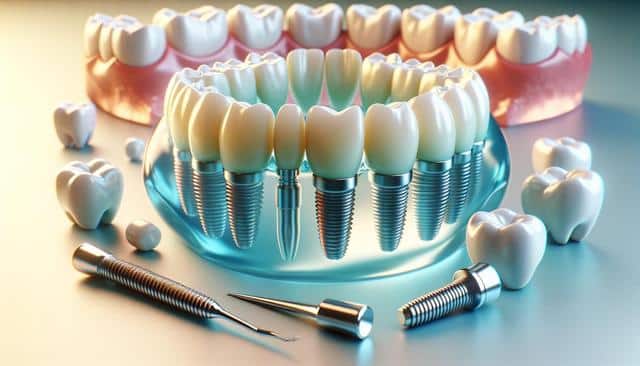The Foundation of Dental Implants: Biocompatible Titanium Roots
Dental implants represent a remarkable advancement in the field of oral restoration. Unlike traditional dentures, which rest on the gum line, implants are anchored into the jawbone, thanks to the use of biocompatible titanium. This metal is renowned for its ability to integrate with bone tissue, creating a stable and durable foundation for the artificial teeth. This integration not only enhances the stability of the implants but also contributes to the preservation of bone mass, a critical aspect often overlooked in traditional solutions.
The use of titanium roots in implants ensures that patients experience minimal invasiveness during the procedure. The process involves placing the titanium post into the jawbone, where it mimics the function of natural tooth roots. Over time, this encourages bone growth around the implant, further solidifying its position. This process, known as osseointegration, is key to the long-term success of dental implants, as it facilitates the natural function of the jaw and prevents bone deterioration.
Natural Aesthetics and Functional Benefits
One of the primary advantages of dental implants is their ability to provide natural aesthetics. The crowns that are attached to the titanium roots are designed to match the color, shape, and size of the surrounding teeth, ensuring a seamless blend with the patient’s natural smile. This attention to detail in the design of implants allows for a more confident smile and improved self-esteem for individuals who have experienced tooth loss.
Beyond aesthetics, dental implants restore significant chewing efficiency, often exceeding 90%. This means that patients can enjoy a wider variety of foods that might be challenging with traditional dentures, such as crunchy fruits and vegetables, nuts, and meats. The robust functionality of implants enhances overall oral health and digestion, providing a more holistic approach to dental care.
Advantages Over Traditional Dentures
Dental implants offer several advantages over traditional dentures, making them a preferred choice for many seeking oral restoration. Some of these advantages include:
- Improved comfort: Unlike dentures that may cause irritation or sore spots, implants are securely anchored, preventing movement and discomfort.
- Enhanced speech: Implants function like natural teeth, reducing the risk of slurred or mumbled speech that can occur with ill-fitting dentures.
- Durability: With appropriate care, dental implants have the potential to last a lifetime, making them a more long-term investment compared to dentures.
These benefits highlight why many patients and dental professionals consider implants among the most effective solutions for tooth loss.
Minimal Invasiveness and Recovery
The procedure for placing dental implants involves minimal invasiveness, particularly when compared to alternative dental restoration methods. Advanced imaging techniques allow dentists to plan the procedure with precision, minimizing the risk of complications. The process typically involves a minor surgical procedure to place the implant post, followed by a period of healing before the crown is attached.
Recovery from dental implant surgery is generally straightforward, with many patients resuming their normal activities within a few days. The use of local anesthesia and sedation options ensures patient comfort throughout the procedure. Adherence to post-operative care instructions, such as maintaining oral hygiene and attending follow-up appointments, is essential to the success of the implants.
Transforming Modern Dentistry
Dental implants have transformed modern dentistry by offering a solution that not only addresses the aesthetic concerns associated with tooth loss but also focuses on preserving oral health. They are a testament to how far dental technology has come, providing patients with options that were once deemed impossible.
The emphasis on natural aesthetics, alongside the structural benefits provided by titanium roots, marks a significant shift in how dental practitioners approach oral restoration. As implants continue to gain popularity, their role in enhancing patients’ quality of life becomes increasingly evident, providing a foundation for better oral health and confidence.
Conclusion: A Reliable Solution for Lasting Oral Health
For those considering options beyond traditional dentures, dental implants offer an outstanding alternative that combines durability with natural aesthetics. By understanding the myriad benefits they provide, including bone preservation and significant improvements in chewing efficiency, individuals can make informed decisions about their oral health. As the field of dentistry continues to evolve, dental implants stand out as a reliable solution, promising lasting benefits and transforming smiles with precision and care.
